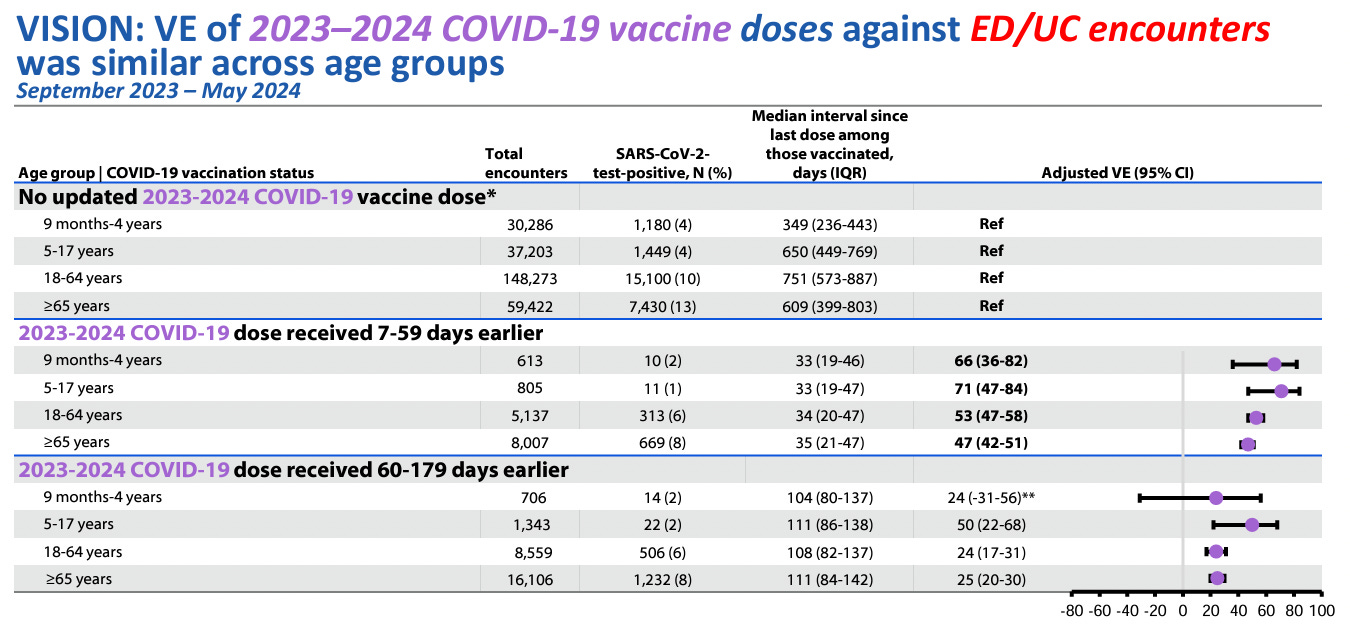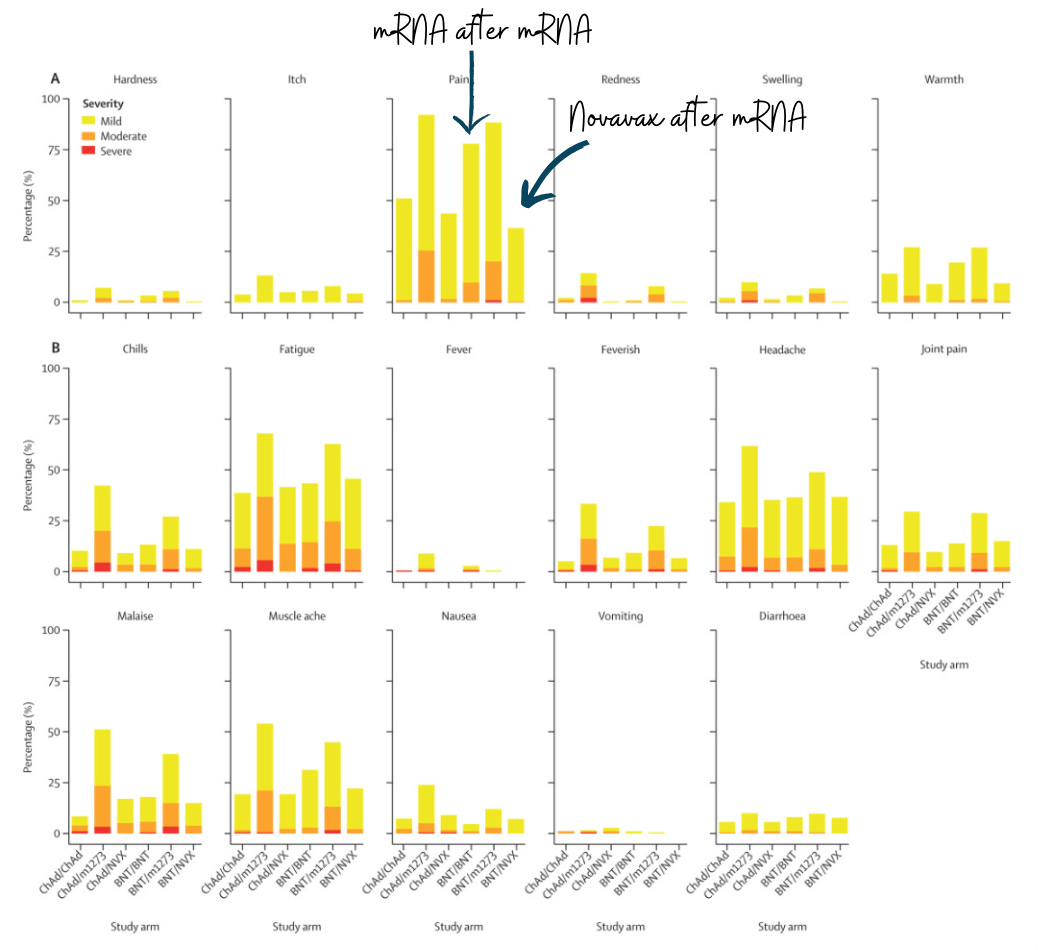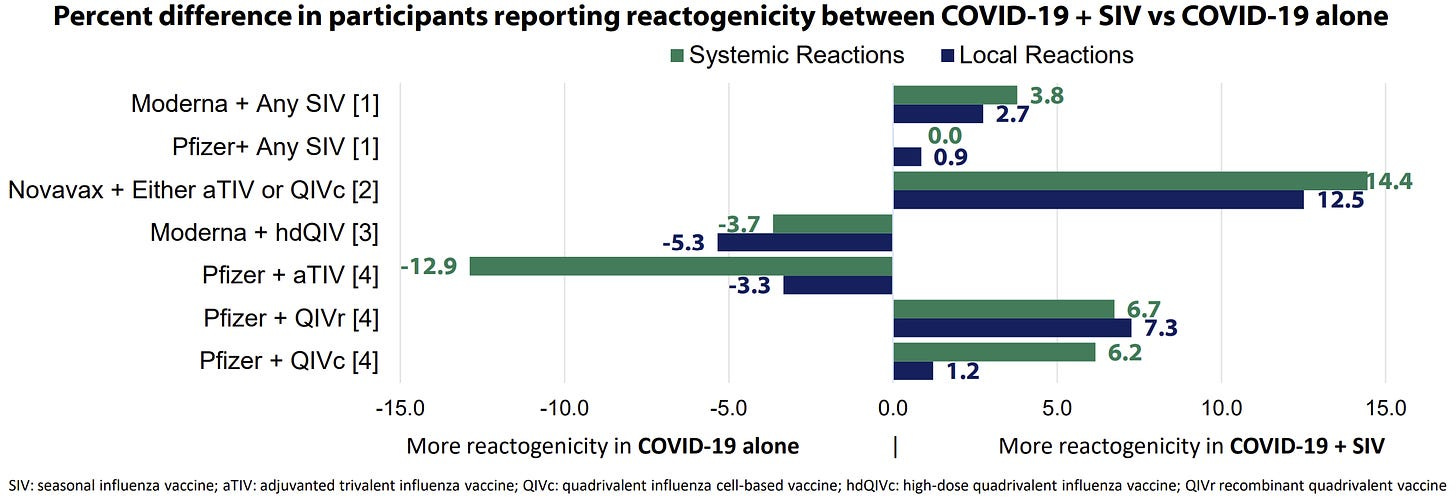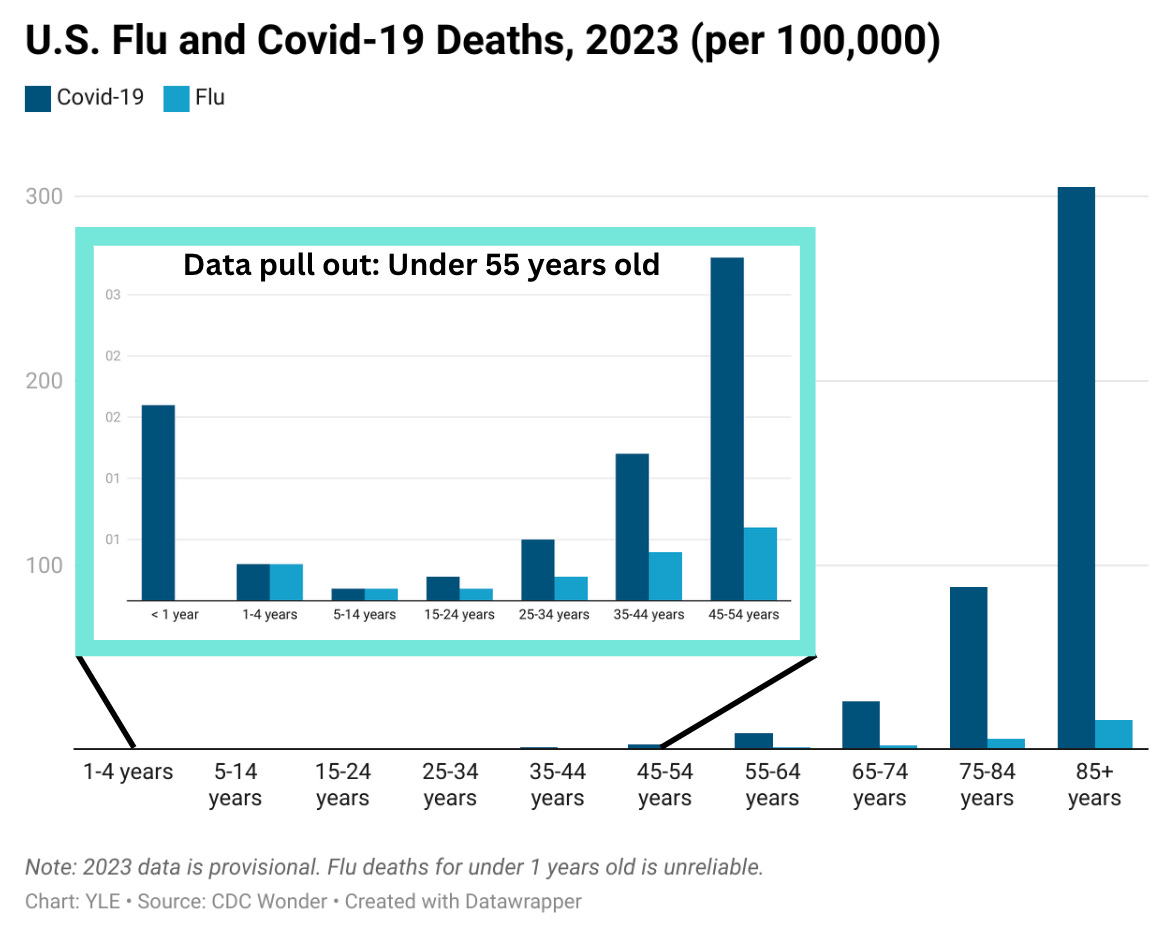Top 6 questions answered about fall vaccines
Waiting, co-administration, kids, Novavax, and free at-home antigen tests
We received many follow-up questions after the last YLE email about options for fall vaccines. Here are the answers to your top questions!
The bottom line is: Get your fall vaccines—it will cut your risk of diseases by half.
Let’s dig in.
1. How long after a Covid-19 infection/vaccination should I wait?
We have frustratingly scarce scientific guidance on timing. What we do have tells us this:
Minimum wait: 2-3 months. A Covid-19 vaccine doesn’t add much benefit within 2-3 months of infection. We don’t have to wait 2-3 months after infection—we won’t “exhaust” or “overwhelm” our immune system. But waiting will reinforce our B cells (our antibody factory that stores some long-term memory).
Maximum wait: 8-12 months. The longer we wait, the more we get out of the vaccine. One study found that waiting 8 months increased neutralizing antibodies 11 times more than waiting 3 months after infection, which would increase the likelihood of preventing infection. Another study found that a 12-month interval improved vaccine effectiveness against hospitalization. But, of course, waiting is a gamble, especially for high-risk people.
Try not to overthink it. 4-6 months is usually the sweet spot. Your healthcare provider is an excellent resource for discussing timing!
2. What if I was not recently infected? And why are vaccines becoming available after the Covid-19 summer peaked?
The U.S. government is trying to force our seasonal flu model to fit Covid-19, but it’s not working well. Covid-19 is clearly not a once-a-year thing—it’s now settled in two waves per year. These vaccines were initially planned in anticipation of the winter wave, but the FDA pushed the release up because we’ve had such a big summer wave.
This makes it very hard to decide when to get the Covid-19 vaccine if you have not recently had an infection or vaccination: Get it now or wait until late fall. I’ve struggled with the decision but decided to wait until Halloween. It will still take some time for vaccines to make it to doctors’ offices, and then a vaccine will still take two weeks to work. By then, we will (hopefully) be well on our way down the current wave. Since I’m not high-risk, I might as well wait to catch the next wave, which will coincide with fun holiday activities I don’t want to miss.
(Dr. Jen Dowd—one of my favorite scientific communicators— just wrote a great post for those seeking more advice on timing. Check it out here.)
Regardless, if the U.S. wants Covid-19 vaccines to have a dramatic population-level effect—like how flu vaccines reduce the impact of flu yearly on hospitals and individual disruptions—we need to have vaccines before a wave. Implementation would be challenging but not impossible.
3. Can I get the flu and Covid-19 vaccine at the same visit?
Yes! This is called co-administration, and it’s recommended for convenience—you don’t have to visit the pharmacy or doctor twice.
Studies have been conducted on the safety and effectiveness of co-administration with Covid-19 vaccines. In one database, about 454,000 people got the flu and Covid-19 vaccines. Both worked great. The rate of side effects was the same or a little higher among those who co-administered; however, no specific safety concerns were identified.
There is no combined shot. (Some companies are working on it. Maybe next year?)
4. Is it worth it for kids? What do other countries do?
In the U.S., everyone 6 months and older is eligible for Covid-19, similar to other countries (like Canada or Japan). Kids in the U.K. or Australia qualify for the Covid-19 vaccine if they have a pre-existing condition. (Note: Not all kids get the flu vaccine in these countries either mainly due to the cost—the government pays for the vaccine, so they must consider this.)
Death: Covid-19 is about as deadly as the flu among kids but far less risky than for older adults (or those under 6 months old). Covid-19 is more risky for those under 6 months, which is why it’s important to get the vaccine during pregnancy.
Effectiveness: They work for kids. Last season, the pediatric vaccines provided ~60% additional protection against going to urgent care for Covid-19, compared to not getting the vaccine.

Safety: Unfortunately, the public hasn’t seen myocarditis (i.e., inflammation of the heart muscle) data for last season yet, but there’s no reason to think it’s changed—while there is a safety signal among young men, the risk dropped dramatically for boosters. An analysis last year showed that the benefits still outweigh the risks. The most common causes of myocarditis are viral infections, where it’s typically much more severe.
Missed school days: I’m frustrated that we don’t have robust data for other outcomes, such as reduced sick days. Since vaccination prevents ~20% of infections in the first few months, we can assume vaccines reduce sick days “a bit.” But other than that, we don’t know, which is unhelpful for parental decision-making.
5. Are you sure that Novavax isn’t better than mRNA vaccines?
Both are good shots. I’m uncomfortable saying one is immunologically better than the other. We’ve had some head-to-head studies (here, here, here, and here) showing lots of similarities and some subtle differences:
Similarities
Both provide a solid first line of defense (i.e., neutralizing antibodies), which helps prevent infection in the first months (but is not perfect.)
Both strengthen a solid second line of defense (i.e., T cells), which helps prevent severe disease.
Differences
Negative: Novavax produced lower levels of a specific antibody called IgG. This may contribute to more infections after Novavax than mRNA vaccines.
Positive: Novavax had a more durable response over time (waned less quickly).
Positive: Novavax has fewer side effects, like pain and muscle aches. For this reason alone, I will be getting Novavax this fall.

6. Free antigen tests will be available again this season.
The U.S. government plans to give each household four free at-home Covid-19 tests again this season. This should open in late September. I will be sure to update you when you can order your tests.
There are flu/Covid-19 combined at-home antigen tests now. There isn’t one for RSV yet.
Bottom line
Fall is almost here! Make a plan to get your vaccines. The best vaccine is the one you get. Our priority is preventing severe disease among high-risk individuals, but staying up to date has secondary benefits for everyone!
Love, YLE
“Your Local Epidemiologist (YLE)” is founded, operated, and written by Dr. Katelyn Jetelina, MPH PhD—an epidemiologist, wife, and mom of two little girls. During the day, she is a senior scientific consultant to a number of organizations, including CDC. At night, she writes this newsletter. Her main goal is to “translate” the ever-evolving public health science so that people will be well-equipped to make evidence-based decisions. This newsletter is free, thanks to the generous support of fellow YLE community members. To support this effort, subscribe below:






Please please! With regard to vaccination of children There is an additional very important epidemiological reason that must be always mentioned. It is often overlooked both by advocates and naysayers: Young kids are carriers of infection and bring it home from school. I am a high risk 82 year old person in a very COVID cautious family. My 5 year old grandson brought it home from school on 2 separate occasions and infected the whole family The first time we all caught it before he even got sick (and had to be hospitalized).
Thank you for addressing Novavax. As someone who has had extremely tough days after the other vaccines, I'm going to try that one this time around. I so appreciate the work you and your team do.